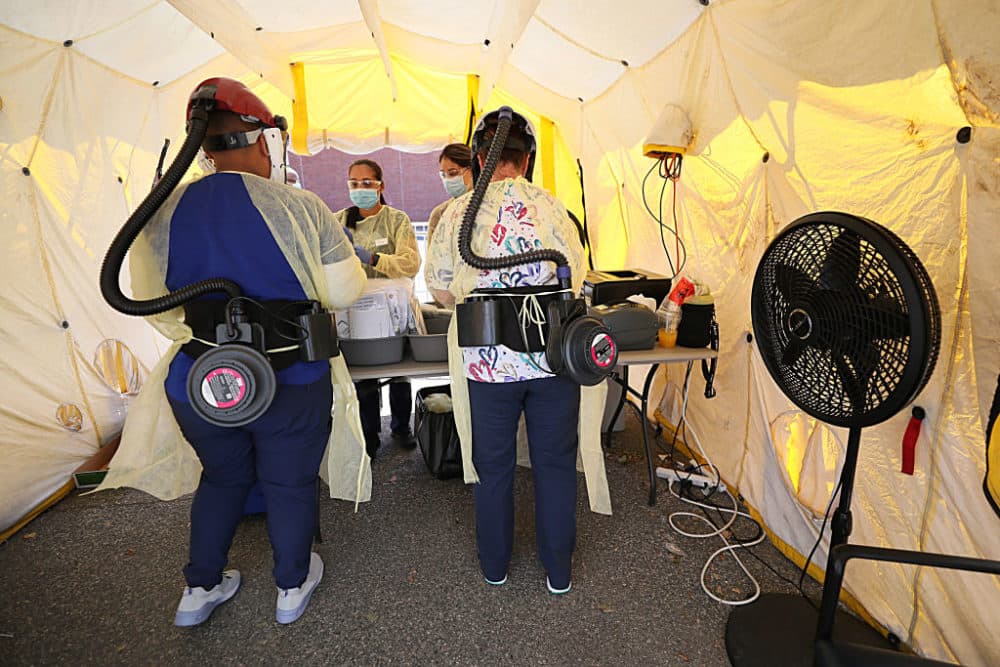Advertisement
Commentary
The Safe Communities Act Isn’t Only About Immigration. It Will Protect Public Health

Why would the medical community be concerned with legislation that would end state and local involvement in immigration enforcement in Massachusetts? The answer is simple: it’s a public health imperative. That’s why we must pass the Safe Communities Act into law.
Nobody should ever fear going to a doctor and receiving the care they need — especially in the middle of a pandemic. But for foreign-born patients, many who come from countries where hospitals are government-run, the unfounded fear that providers will share their personal information with Immigration and Customs Enforcement (ICE) can outweigh the risk to them or their loved ones. The ongoing collaboration between local law enforcement and ICE fuels this perception.
The Safe Communities Act (S.1401/H.3573) is a logical and necessary step toward ensuring that immigrant patients can confidently seek the health care services they need, particularly at a time when public health is threatened by the COVID-19 pandemic.
Currently pending before the state legislature, which remains in extended session, the bill has the approval of the Joint Committee on Public Safety and Homeland Security, which has recommended it for passage this year. It now awaits action by the legislature’s Committee on Ways and Means. With only four weeks remaining until the end of the legislative session, there is no time to lose.
Immigrant communities have been hard hit by COVID-19. Hospitals including Massachusetts General Hospital have seen a dramatic surge in admissions of COVID-19 positive, limited English proficiency patients. Providing unfettered access to health care for these patients is critical to protecting overall public health. These communities disproportionately include low-income residents working essential jobs and living in crowded, multigenerational households.
Cultivating trust in medical providers and public health officials protects us all, and is critical to fighting the pandemic.
But even while experiencing illness and death at levels higher than the general population, we see a decline in the number of immigrant patients seeking needed health care, even in emergency situations.
For example, in expressing their support of the bill, the Massachusetts General Hospital (MGH) Executive Committee on Community Health (ECOCH) pointed to the example of a patient who was so afraid of deportation that he did not seek treatment for COVID-19. Eventually, his brother called 911 (against his wishes). By that point, he was so sick that he required urgent intubation and mechanical ventilation. With a virus that progresses as rapidly and unpredictably as COVID-19, every minute makes a difference and any delay in seeking care could be deadly.
Additionally, despite the availability of isolation hotels, some immigrants are hesitant to use them out of fear of deportation. Mass General also highlighted the example of a patient in Chelsea, Mass. who was too afraid to leave his home and risk an interaction with ICE that he remained at home while he was sick — as a result, he infected two family members who ended up in the hospital.
We have encountered similar stories of immigrant patients reluctant to participate in contact tracing efforts — which gather critical information for isolating and preventing the spread of COVID-19 — due to fear of government agencies.
During the Trump administration, community health centers have seen an increasing number of immigrant patients disenrolling from health benefits for which they are eligible and delaying or avoiding care — all out of fear.
This is not only harmful for these families, but for our entire community. Cultivating trust in medical providers and public health officials protects us all, and is critical to fighting the pandemic. Especially as we prepare for the distribution of a vaccine, it is essential that we take swift action to address these fears and build trust.
The Safe Communities Act is a necessary public health response to the pandemic
The Safe Communities Act sends a powerful message to immigrant communities that public health officials and other state officials are not involved in immigration enforcement. It creates uniform guidelines for law enforcement interactions with ICE that do not interfere with their responsibility to enforce state and federal criminal laws.
These aren’t radical changes. Similar policies are already in effect in dozens of the commonwealth’s municipalities and police departments. These public officials know that ending their involvement in deportations cultivates public trust in law enforcement and other public agencies.
Massachusetts has been involved in deportations through successive presidential administrations, Democratic and Republican alike. Such policies will likely continue without legislative action. Creating a uniform standard across the commonwealth would encourage everyone to seek medical care and any other assistance that they need without fear of deportation.
The Safe Communities Act is a necessary public health response to the pandemic, and we encourage state legislators to take it up without delay.

